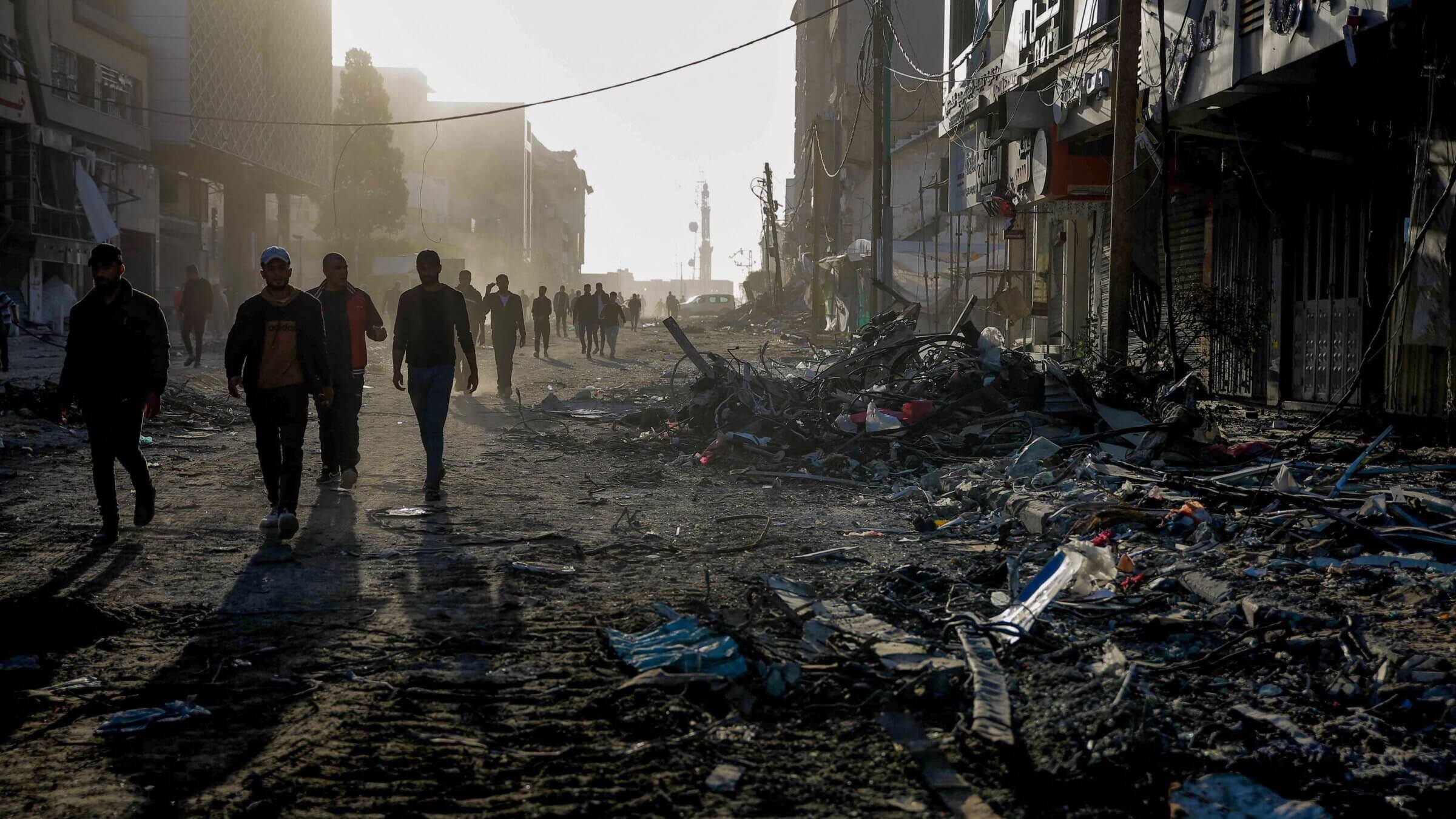Calls to depopulate Gaza are a dangerous pipe dream
Population transfer is as morally and strategically indefensible as many of the Israeli right’s other fantasies.

Palestinians walk amid the rubble of destroyed buildings in Gaza City on Nov. 24, 2023. Photo by OMAR EL-QATTAA/AFP via Getty Images
Here’s a New Year’s resolution for Israelis, Palestinians and their friends and allies abroad: In 2024, let’s leave destructive, failed ideas in the past, starting with the notion that the Palestinian people or the State of Israel are just temporary inconveniences that can or should go away.
Perhaps the most glaring manifestation of this toxic philosophy in recent days has been the outlandish statements from a number of Israeli officials about resettling Gazans outside of the Strip, including alleged talks with third countries on the actual execution of such a population transfer. Even Prime Minister Netanyahu has taken this up of late, reportedly discussing the idea with Likud members of Knesset in late December.
Finance Minister Bezalel Smotrich has sanitized population transfer as “out-of-the-box thinking.” Aside from being dangerous, such an idea isn’t actually new.
Some Israeli leaders were already fielding proposals euphemistically marketed as “voluntary migration” within days of the brutal Hamas terrorist attack that kicked off the ongoing war. Less than a week after Oct. 7, Israel’s Intelligence Ministry drafted a concept paper detailing policy options including moving Gazan Palestinians into Egypt’s Sinai Peninsula. For years, extremists have been quietly working at piecemeal population transfer in the West Bank.
Before the war, resettlement was a popular idea among some right-wing Israeli academics, pundits, think tankers and, behind closed doors, government officials. Their worldview held that the Palestinians could be bribed and/or bullied out of nationhood and that the sovereignty of neighboring Arab states was artificial and flexible. We can easily draw a line from past calls to dump the Palestinians in the Sinai or Jordan and current talk of emigration. The conflict in Gaza has merely given a pretext.
Sure, Israel may have the power to coerce Palestinians to leave Gaza. But there is ample evidence to suggest that would not end the conflict, nor bring Israel a decisive victory.
The violent history of eliminationist rhetoric
Before the 1993 Oslo Accords, conflicts with Israel and rival Arab regimes saw the Palestinian Liberation Organization driven from Jordan to Lebanon to Tunisia.
The Palestinian population endured significant humanitarian and political setbacks in 1948 and 1967. After the Six-Day War, in 1969, Israel actually negotiated a secret deal with Paraguay to pay 60,000 Gazans (about 15% of the Strip’s population) to move to the South American country. The plan attracted precious few volunteers. The Palestinians and their national cause, of course, remain.
The right’s obsession with defeating the very concept of Palestinian nationalism is not only delusional: It also contributed significantly to Israel’s weakness on Oct. 7. Netanyahu boasted for years that cash payments to Hamas were the key to keeping Palestinians divided and thus preventing a two-state solution. And on the day that Hamas terrorists flew, drove and even walked across a woefully underprotected border and murdered over a thousand Israelis, the bulk of the Israeli army’s strength was focused on guarding settlers on the other side of the country, as it had been for years.
In the wake of Hamas’s massive attacks, the Biden administration and others have taken flack for holding fast to some kind of two-state solution. Yet for decades, there has only been a one-state reality in which Israel is the dominant party, and it has gotten neither Israelis nor Palestinians any closer to lasting peace and security. Thus, the past three months have not been an indictment of hypothetical compromise: they illustrate the price of real maximalism.
Population transfer is as morally and strategically indefensible as many of the Israeli right’s other fantasies. Yet just because something is a bad idea does not mean it won’t be tried, and at a great human cost. The terrorist attacks of Oct. 7— motivated by the self-destructive belief that Israel can be toppled through wanton violence — are a tragic reminder of that fact.
For seven-and-a-half decades, attempts at bringing the Jewish state down through violence have likewise only brought ruin on those who have tried. Hamas knows this. Numerous Hamas leaders have conceded that the price for their fanatical designs would be paid in Palestinian blood. “Will we have to pay a price?” Hamas politburo member Ghazi Hamad asked rhetorically two weeks after Oct. 7. “Yes, and we are ready to pay it.”
In November, as the death toll in Gaza climbed, Khaled Mashal, from his safe haven in Qatar, opined to an incredulous Saudi interviewer that “no nation is liberated without sacrifices.”
A growing chorus of left-wing commentators are calling for one Palestine, from the river to the sea — even as Hamas’s attempts to achieve it go up in flames. Most in the West frame their arguments in terms of equal rights for all (contrary to the rhetoric coming from Middle Eastern capitals from Tehran to Beirut and Damascus), which sounds nice on paper. But Hamas’ merciless, execution-style killings of hundreds of Israeli civilians, its physical and psychological torture of thousands more, and the kidnapping of over 200 civilian hostages have completely discredited an already questionable idea. I cannot fathom how anyone could look at the events of Oct. 7 and earnestly say that a single state in all of former Mandatory Palestine would not be a recipe for civil war.
It was clear to anyone paying attention that there was never really a constituency in Gaza and the West Bank for a rainbow Palestine, but the popular international reaction to the Oct. 7 war raises doubts about whether Western progressive one-staters ever genuinely cared about the safety of Jews at all, in one-state proposals and otherwise.
Hamas’s useful idiots in American activist groups and on college campuses, who have spent the past few months cosplaying as revolutionaries, declaring all Israeli civilians legitimate military targets and tearing down and defacing missing posters, betray a fundamental ignorance of actual, successful revolutions.
Take South Africa, for example: the African National Congress did wage a violent struggle against apartheid. But in decades of struggle against white supremacist rule, its armed wing killed comparatively few civilians: The ANC’s non-combatant body count over a period of several years of attacks in the 1970s and 80s, as determined by the post-apartheid Truth and Reconciliation Commission, represents a fraction of Hamas murders from a single day.
The ANC’s Freedom Charter represented a public commitment to multiracial equality and democracy from the outset. There is no equivalent document among the various militant factions seeking to redeem all of Palestine, only the repeatedly-disproven conception of Israel as an artificial colonial entity that can be broken down and expelled once and for all like the brittle white-minority regimes in Africa.
As the Gaza conflict drags into 2024, we need to take the blinders off. A campaign to root out the malignant forces of Hamas is destined to lead to interminable bloodshed if it becomes a campaign to uproot all Palestinians.
Palestinians and their advocates in the West likewise must reckon with the fact that the current war began with a violent crusade against the very existence of an established state, a misadventure that was equal parts murderous and quixotic.
Anyone familiar with Israelis’ and Palestinians’ parallel histories of refugeehood and exile should understand that displacement and dispossession will not extinguish a people’s national aspirations.
Palestinians and Israelis are not ephemeral. They are human beings, whose nations and communities constitute permanent facts on the ground. They will not be transferred or terrorized into submission.
To contact the author, email [email protected].
A message from our Publisher & CEO Rachel Fishman Feddersen

I hope you appreciated this article. Before you go, I’d like to ask you to please support the Forward’s award-winning, nonprofit journalism so that we can be prepared for whatever news 2025 brings.
At a time when other newsrooms are closing or cutting back, the Forward has removed its paywall and invested additional resources to report on the ground from Israel and around the U.S. on the impact of the war, rising antisemitism and polarized discourse.
Readers like you make it all possible. Support our work by becoming a Forward Member and connect with our journalism and your community.
— Rachel Fishman Feddersen, Publisher and CEO




























